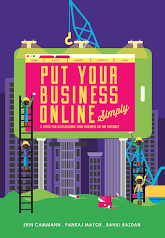5 Problems With Most Website Builder Tools Issues that small business owners need to understand

When small business owners decide to create an online business platform, they face a number of website builder tools they can use to get the job done. From major players like Wordpress, to other options such as Wix and Weebly, it can be overwhelming to keep options and offerings straight.
Before choosing a website builder, business owners should understand that a number of these website building tools have a number of serious flaws. Below, we've outlined some of the top problems faced by users of these tools, and a better alternative to those website builders.
Reliance on third-party apps
Websites that have been built by most website builders incorporate a slew of features, but these bells and whistles have been integrated into the tool. That's because users of these website builders rely on third-party apps to add things like calendars, newsletters, slideshows, or appointment reminders onto their websites. Thousands of third-party apps exist for these website builders, and without a background in website development, sifting through them can be overwhelming for most small business owners.
Once these third-party apps are downloaded onto a website, they must be maintained and updated by the business owner, and lack customer support if issues arise.
Problems with developing and maintaining the site
Most website builders offer an array of templates through their DIY service, but again, this surplus can be overwhelming for someone who lacks a background in website design and development. Moreover, these sites are not always optimized across different browsers or mobile devices.
Using a DIY website builder requires business owners to either get quickly up to speed with website development, or hire a pricey contractor to create and maintain the site for them.
Lack of e-commerce tools
Small business owners will want their website to incorporate e-commerce tools such as CRM functions, contact management tools, appointment schedulers, discounter managers, and merchant account services.
Most DIY website builders allow you to incorporate these features using third-party apps, but again, users will run into the problems associated with these apps that we've outlined above.
Security issues
Some DIY website builders, like Wordpress, are open-source software, which are susceptible to hackers and can spell security trouble. Additionally, the third-party apps you might integrate on your website are also susceptible to security issues. There are many cases of Wordpress sites getting hacked, and creating a major headache for small business owners, as their sites go offline, or customer data is stolen.
High cost and lack of customer support
Although some versions of website builder tools are free, most small business owners will need to upgrade to more powerful versions, which can be expensive. Additionally, many owners without a tech background will want to hire pricey website developers or designers to create their site. Moreover, owners will also face additional costs for website hosting and integrating outside tools.
The Alternative: A Website Building Platform
A website building platform, like Ocoos, offers an integrated, off-the-shelf solution for creating small business websites. The platform's technology, maintenance, and updates are handled behind the scenes, and e-commerce tools are already integrated into the platform -- there's no need to rely on third-party apps. The website is optimized across mobile devices and browsers, even as technology changes.
Ocoos even offers a concierge service who will consult with business owners and build the website that meets their goals and user needs. This is a cost-effective alternative to DIY website builders which require pricey developers to often lend a hand.


